

2024 Annual Report
Dear Child Health Advocate,
We are pleased to share the 2024 Community Health & Advocacy Annual Report for Children’s Nebraska, highlighting the work and dedication of our team in powering Children’s mission to improve the life of every child through exceptional care, advocacy, research and education.
Children’s Community Health & Advocacy serves as our community health hub, dedicated to advocating for children through partnerships, programming and community engagement. Approximately 80% of health outcomes are shaped beyond the walls of clinics or hospitals, and our team works to positively impact where children learn, live and play so they can thrive.
This report highlights our impactful work, including:
• A summary of our three-year Implementation Strategy Plan, which focuses on addressing social drivers of health at the community level, along with an overview of the 2024 Pediatric Community Health Needs Assessment that will guide our efforts for the next three years.
• BeInvolved, Children’s community volunteer program that engages hundreds of team members in supporting child health initiatives.
• Community Impact Grants that have supported various community-based organizations, including one that provided small loans to help families achieve financial stability — yielding a threefold return on our initial investment.
• School nurse training and mentorship programs that offer best-practice support and professional development for new and experienced school nurses across the state.
• STRONG training, which equips the school mental health workforce to meet the unique needs of refugee children.
• Lincoln Public Schools’ recognition as the first large district in Nebraska to designate all its schools and sites as Heart Safe through Project ADAM.
As we celebrate the past year’s achievements and look forward to the next, we are deeply grateful for the support of our community and the invaluable partnerships within our health system and beyond.
In good health,

Vice President, Community Health & Advocacy
Director, Community Health & Advocacy
About Children’s Community Health & Advocacy
Children’s Community Health & Advocacy connects and empowers child health advocates to drive health excellence by positively impacting where children live, learn and play. We work to create an engaged community where every child has the opportunity to be happy and healthy.
Our commitments include:
• Increasing Access to Care in the Community
• Addressing Social Drivers of Health
• Improving Pediatric Mental Wellness
• Serving as the Trusted Source for School Health
In 2024, Community Health & Advocacy restructured around two main pillars: Community Benefit & Engagement and School Health. These teams lead initiatives, foster partnerships and drive outcomes to improve children’s health.
Learn more about Children’s Community Health & Advocacy at ChildrensNebraska.org/Advocacy
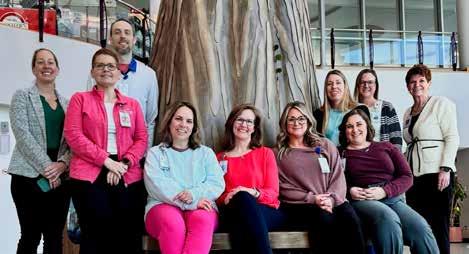
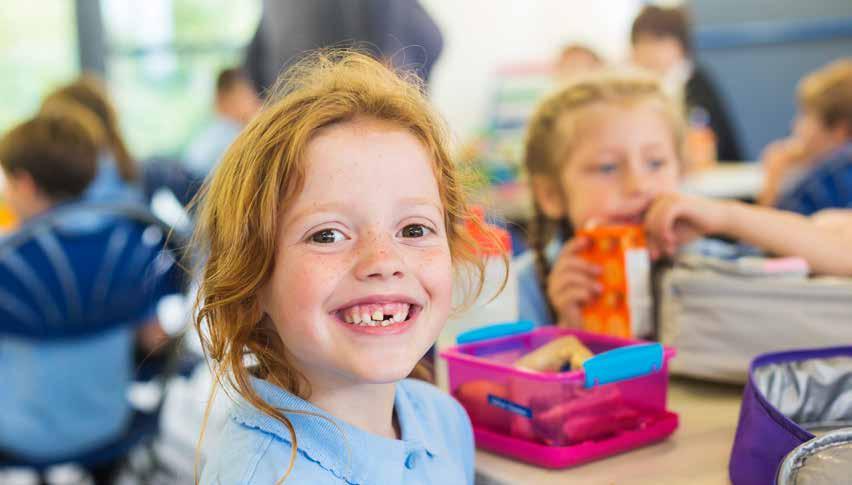
Community Benefit & Engagement
The Community Benefit & Engagement team drives and supports community impact efforts both within the hospital and through external partnerships. They oversee and report on Community Benefit programs and lead the triennial Pediatric Community Health Needs Assessment and Implementation Strategy Plan. They also collaborate with key stakeholders at Children’s and within the community to enhance programs that address social drivers of health and expand care access, with a focus on underserved populations.
Championing Policies That Impact Children – Family Advocacy Day
Children’s Nebraska participates in the Children’s Hospital Association’s Family Advocacy Day, an annual event held in Washington, D.C. A patient family from Children’s is chosen to advocate on Capitol Hill with federal policymakers, increasing awareness about the unique role children’s hospitals play in the health and wellbeing of children.
In 2024, 10-year-old patient Emersyn and her family shared their story on Capitol Hill, highlighting the vital role Children’s plays in supporting communities across the region and the unique challenges faced by pediatric patients and their families. Joined by Melanie Thornton, Children’s director of Government Affairs, the Arterburns advocated for increased investments and support for Medicaid and the Children’s Health Insurance Program (CHIP), expanded mental health services for children and teens and a stronger pediatric healthcare workforce.
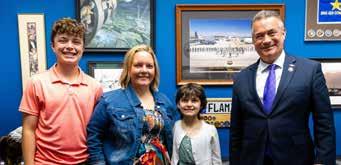

Scan QR code to watch a short video of Emersyn’s visit to Capitol Hill

2022-24 Implementation Strategy Plan drives impact and community involvement
In 2024, Children’s Community Health & Advocacy concluded its work on the 2022-24 Implementation Strategy Plan. This plan was developed following the 2021 Pediatric Community Health Needs Assessment (PCHNA), which identified four key impact areas to guide efforts in improving child health from 2022 through 2024.
Informed by PCHNA data, alignment with Children’s strategic plan and a commitment to addressing health disparities, the team prioritized four focus areas — three of which are social drivers of health: financial stability, food security and healthy housing, along with pediatric mental wellness.
KEY HIGHLIGHTS:
• 10 Community Learning Tours engaged 86 Children’s team members, offering firsthand insight into organizations addressing social drivers of health.
• 27 community organizations received program contributions to support their work serving children and families.
• Caring Contacts, a program administered by Care Coordination that sends handwritten notes to children seen in the Emergency Department for suicidal ideation, was expanded and replicated nationally.
• Strategic partnerships with Habitat for Humanity, Omaha Bridges Out of Poverty, United Way of the Midlands and WorkLab Solutions helped deliver programs supporting Children’s team members.
• Healthy Housing initiatives advanced through stakeholder collaboration with the Mid-America Pediatric Environmental Health Specialty Unit, leading to the appointment of a Children’s Healthy Housing physician champion.
$170,000 in Community Health Contributions
provided to child-serving organizations focused on underrepresented populations, including those in rural communities, people of color and people with low incomes.
10 Community Impact Grants
completed to improve the health of underrepresented children and families across Nebraska in the areas of financial stability, food security, healthy housing and pediatric mental wellness.
7 Child Health Data Gallery Walks
were hosted in the community to share data and gather input for the 2024 Pediatric Community Health Needs Assessment.
$205.9 Million Financial Commitment to the Community as outlined in the 2023 Community Impact Report.

2,830 Hours Volunteered by 610 Children’s team members at community organizations working to improve child health.
52 Children’s Team Members
working on internal committees to address patient and community health disparities.
Community engagement through board service
Children’s is dedicated to improving the health of children and families. One way we achieve this is by engaging in our communities through volunteer board and committee service. In 2024, 18 Children’s team members served as board members with strategically aligned organizations.
In 2024, we launched an initiative to support team members who want to share their expertise with nonprofit organizations addressing community health needs. Through an interview process, team members are matched with organizations seeking board members from Children’s. Participants also receive resources and training to enhance their skills as volunteer board members.

Children’s 2024 Pediatric Community Health Needs Assessment guides future impact areas for Omaha metro
In 2024, Children’s released its latest triennial Pediatric Community Health Needs Assessment for the Omaha metro, offering a comprehensive overview of children’s health in the region used to develop the 2025-27 Implementation Strategy Plan. The report highlights key data on health conditions, experiences, barriers to care, behaviors and social drivers of health for children in Douglas, Sarpy, Pottawattamie and Cass counties. Findings are segmented by geography, race/ethnicity, age, gender and family income, providing valuable insights into community health challenges.
To engage the community, Children’s hosted a series of Child Health Data Gallery Walk events at six locations and online. These interactive sessions allowed attendees to explore the data, share feedback and help shape Children’s health priorities for the next three years.
Guided by these conversations and data-driven insights, Children’s reaffirmed and expanded its impact areas, which will direct its efforts moving forward:
• Access to Care
• Pediatric Mental Health & Wellness
• Social Drivers of Health

By focusing on these areas, Children’s is committed to improving the health and wellbeing of children and families across the Omaha metro, ensuring community voices shape a healthier future.
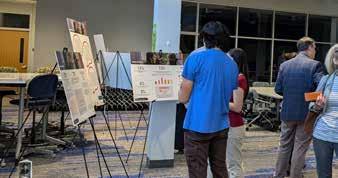
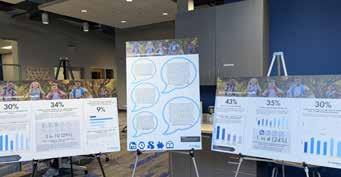

Scan the QR code to access the 2024 Pediatric Community Health Needs Assessment
Children’s Community Impact
Grants empower local organizations to advance health initiatives for children and families with greatest need
During the 2023-24 Community Impact Grant cycle, Children’s invested in local organizations dedicated to improving the lives of children and families. Ten community-based organizations received $25,000 grants to support initiatives in financial stability, food security, healthy housing and pediatric mental wellness. These programs served children and families across Omaha, Lincoln, Red Cloud and northeast Nebraska.
Beyond funding, the program strengthened organizations through a learning collaborative, helping them deepen their understanding of program evaluation, child health issues and impact measurement.
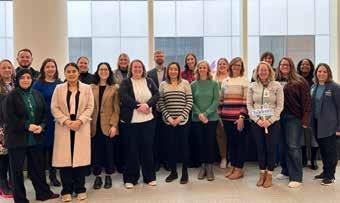
GRANTEE ORGANIZATIONS & LOCATIONS
Statewide
• Legal Aid of Nebraska – Healthy Housing and Financial Stability
Northeast Nebraska Counties
• Nebraska Diaper Bank – Financial Stability and Pediatric Mental Wellness
Douglas County
• Big Brothers Big Sisters of the Midlands –Pediatric Mental Awareness
• Completely KIDS – Pediatric Mental Wellness
• Nelson Mandela Elementary School –Food Security
• Restoring Dignity – Healthy Housing
• Lending Link – Financial Stability
Webster County
• The Valley Child Development Center –Food Security and Financial Stability
Lancaster County
• Lincoln Public Schools – Pediatric Mental Wellness
• CEDARS Youth Services – Financial Stability

Scan QR code to learn more about the 2023-24 Community Impact Grants
Community Impact Grant Highlights


Lending Link provided financial assistance to low-income women and single mothers with small low-interest loans for essential expenses like rent, vehicle repairs, medical emergencies and credit building. During the grant cycle, Lending Link issued 66 loans totaling $79,350. As the loan repayment cycle continues, the initial $25,000 investment will sustain itself indefinitely.
Lending Link says, “The partnership that we have established with Children’s has allowed us to help those who otherwise might have nowhere else to turn.”


Nelson Mandela Elementary School designed and built a greenhouse and developed an associated curriculum to educate students on sustainable growing practices, the importance of fresh produce and the connection between food and health. The greenhouse yields are harvested, weighed and distributed to students, families and community members, with priority given to food-insecure households. In its first year, the greenhouse produced nearly 150 pounds of fresh produce. “The curriculum updates and hands-on experiences have positively impacted our students, staff and the broader community,” said the Nelson Mandela team when asked about the benefits of the grant program. “We continue to see the tangible benefits of a garden-based education, which promotes healthy eating, community engagement and a deeper connection to the environment.”
BeInvolved enhances employee wellbeing and community awareness
Children’s Community Health & Advocacy and the Wellbeing team in Human Resources developed a unique partnership to create meaningful volunteer opportunities. The initiative enhances the wellbeing of team members while connecting them with organizations that support Children’s patients and families.
“I absolutely love this program. It is extremely beneficial to my mental health and I love that plenty of opportunities are set up for us by the BeInvolved team. We just have to make time and show up!”
– Children’s Nebraska team member
Launched in 2022, BeInvolved is a Volunteer Time Off program that provides benefits-eligible team members with eight hours of paid volunteer time to support community organizations focused on children’s and families’ wellbeing. Team members can choose their own volunteer experiences or participate in organized opportunities.
In 2024, 610 team members volunteered a total of 2,830 hours. Among them, 93% reported improved personal wellbeing, and 96% gained a better understanding of community resources available to support patients and families.
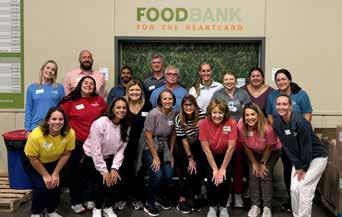

About School Health
Children’s School Health team is dedicated to improving the health and wellbeing of students by developing and enhancing strategies and programs that support health and the educational goals of students across Nebraska. Through school-based programs and collaborative initiatives, the team works to ensure all children have access to the care and resources they need to succeed in and out of the classroom. By addressing both physical and mental health needs, the team helps create a supportive environment where students can thrive.
Back to school training for school nurses enhances skills and knowledge to better serve students
Following the success of the 2023 pilot program, which aimed to enhance the capabilities of school nurses across the state, Children’s expanded the event in 2024 into a larger, hybrid format. The skills training program included 58 nurses from around the state, who rotated through eight distinct stations.
Expert providers from Children’s led sessions on critical health topics commonly encountered by school nurses, including:
• Audiology
• Pulmonology
• Optometry/ Vision Outreach
• Neurology
• Endocrinology
• Trauma
• Project ADAM
• Sports Medicine
These sessions were designed to enhance the knowledge and skills of school nurses, offering a comprehensive view of the latest developments in child and adolescent health.
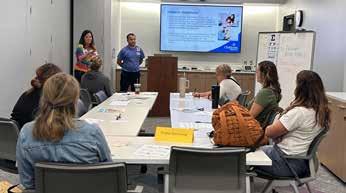
School nurses attending the Optometry/Vision Outreach learning session
Attendee feedback was overwhelmingly positive. Nurses reported a significant increase in their knowledge across all topics and unanimously agreed they would recommend future skills training sessions to their peers. This annual training initiative highlights the commitment to empowering school nurses with the knowledge and tools necessary to make a meaningful impact on the health and wellbeing of students.

Over 1,000 Youth
attended Children’s School Health sponsored events
4 Guides and Reports
were published supporting school health professionals including Remove/Reduce, Educate, Adjust/Accommodate, Pace (REAP) concussion manual, the Nebraska Infection Control for Education Book (NICE), Rule 59 updates and the School Nurse Workforce Report
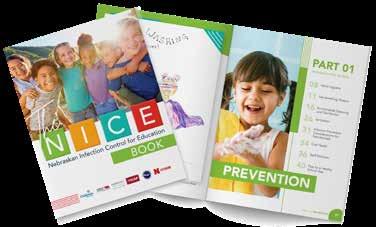
Children’s is a founding member in national effort to create school-friendly health systems ensuring optimal health and academic success for children
Children’s is proud to participate in an innovative national initiative aimed at transforming the way healthcare and education work together to support children. As one of six children’s hospitals selected to join a cohort led by Children’s National Hospital, Children’s is building and improving partnerships with schools as part of the School-Friendly Health System (SFHS) framework. This groundbreaking project strives to ensure that all children receive the healthcare they need while also maximizing their academic potential.
The SFHS framework is built on five core principles, each offering clear practices for healthcare systems to follow in order to support the dual goals of optimal health and academic achievement for every child. The framework’s focus is to create a collaborative environment where health services are seamlessly integrated with schools, fostering stronger partnerships between health providers, educators and families.
Children’s was featured in a case study focused on the awareness principle, featuring a close partnership with the Nebraska Department of Education (NDE) to support collaborative school health positions in the Office of Coordinated Student Support Services to strengthen awareness in schools for physical and mental health supports.
TOUCHPOINTS
PROVIDERS


Scan QR code to learn more about SFHS
Scan QR code for SFHS case examples
Children’s Nebraska supports 2024 Nebraska Native Youth Gathering
More than 400 Native youth from across Nebraska gathered at the 2024 Nebraska Native Youth Gathering, “Strengthening Indigenous Leaders,” held in Winnebago. During the gathering, attendees engaged in a variety of activities centered around wellbeing and culture, which honors the Sacred Hoop: Body, Spirit, Heart and Mind. Children’s School Health Team, as part of a Nebraska Department of Health & Human Services (DHHS) Title V Maternal Child Health block grant, assisted in the planning of this event and created and distributed 300 medicine pouches handcrafted by Delberta Frazier, an Isanti Community Schools STEM (Science, Technology, Engineering, and Mathematics) and FCS (Family Consumer Science) teacher. The hand-sewn leather medicine pouches were provided to the students, along with sacred medicinal herbs of sweetgrass, tobacco, sage and cedar that were grown in Ms. Frazier’s garden and harvested according to traditional cultural practices. Medicine pouches contain sacred items that signify personal wellbeing and community identity and are worn as a symbol of spiritual protection (see photograph to the right). They bear significant importance in Native American tribal communities and the cultural practice has been passed down for generations by the ancestors.

A breakout session presenter reflected on the importance of the event saying, “Culture is a big part of our identity and I think… it’s important because it gives you a sense of who you are and where you came from.”

Scan QR code to view the YouTube video
Project ADAM empowers schools to respond to sudden cardiac arrest, saving lives
Project ADAM stands for Automated Defibrillators in Adam’s Memory. It is a national initiative named for Adam Lemel, a 17-yearold who collapsed and died from sudden cardiac arrest in 1999 while playing basketball. Defibrillation could have saved his life. Adam’s parents collaborated with Children’s Wisconsin to create the program in his memory.
Children’s became a Project ADAM affiliate healthcare site in 2022.
Project ADAM’s Heart Safe Schools program ensures that schools are equipped with well-maintained automated external defibrillators (AEDs), CPR/AED-trained staff and a practiced emergency response plan for sudden cardiac arrest. This program provides students, staff and visitors with the best possible chance of survival in the event of sudden cardiac arrest.
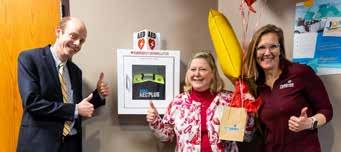
Heart Safe Schools have taken all the steps necessary to safeguard the health of students, including:
• Making AEDs available and accessible
• Formalizing a sudden cardiac arrest (SCA) emergency response plan and trained emergency response team
• Performing SCA drills annually
• Maintaining equipment and designation at regular intervals
98 Schools designated as Heart Safe Schools during the 2023-24 school year
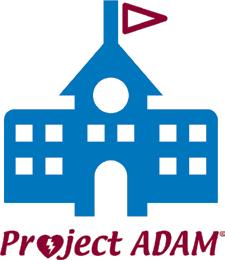
DISTRICT-WIDE HEART SAFE SCHOOLS
In May 2024, Children’s partnered with Lincoln Public Schools (LPS) to celebrate the district-wide Heart Safe School designation for all 70 LPS schools and sites. As the second-largest school district in Nebraska, LPS is now better equipped to respond to unexpected cardiac events across its campuses.
The district has a practiced response plan, fully functional automated external defibrillators (AEDs) and staff trained in AED/CPR. The 70 designated sites include 41 elementary schools, 13 middle schools, eight high schools, the district office and seven focus programs, communities and education centers, serving nearly 42,000 students, over 7,500 teachers and staff and countless community visitors each day.
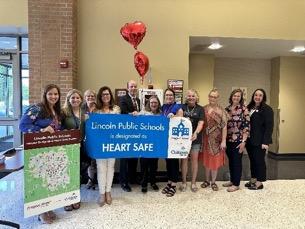
Children’s partners with the Nebraska Department of Education to support refugee and migrant students through STRONG training
In 2024, Children’s School Health team designed and delivered crucial training aimed at supporting refugee and migrant students as part of the Nebraska Department of Education Project AWARE (Advancing Wellness and Resiliency in Education) program. The training, known as Supporting Transition Resilience for Newcomer Groups (STRONG) for Schools, is designed to address the emotional challenges faced by students navigating the hardships of migration and resettlement.
Refugee and migrant students often face unique challenges that can impact their mental health and academic performance. This program provides valuable tools for school staff to assist these students in managing their emotions and building resilience during their transition.
Fifteen school staff members from schools with large populations of refugee and migrant students participated in the training. By equipping these educators with the skills and knowledge to identify and address emotional distress, the training has contributed to creating a more supportive and understanding school environment for these vulnerable students.
“I am so grateful for everything the school is doing to help with my children. They have seen so much; they have not had a normal childhood. My son is a scared boy, and he misbehaves when he is scared. I want him to learn how to manage this so he can have a better life than I had. I wish we had these groups for the parents!”
– parent of a student in the STRONG program
Supporting Transition Resilience of
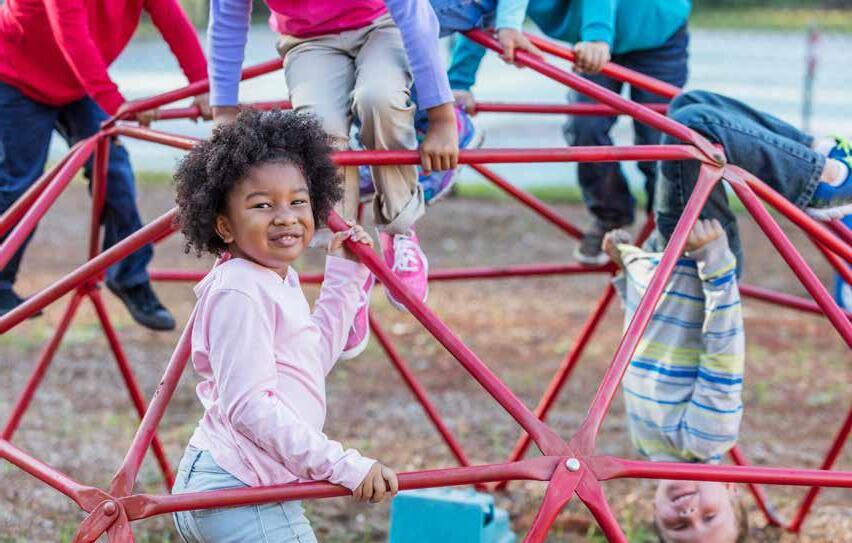
LOOKING FORWARD TO 2025
COMMUNITY BENEFIT & ENGAGEMENT:
2025 marks the beginning of a new three-year cycle for Children’s Implementation Strategy Plan, developed in response to the community health needs identified in the triennial Pediatric Community Health Needs Assessment, most recently completed in late 2024. Based on the assessment’s findings, Children’s will prioritize programs and initiatives that improve access to care, raise awareness of social drivers of health and enhance pediatric mental wellness.
Goals identified in the Implementation Strategy Plan include:
• Goal 1: Enhance access to healthcare by removing barriers to care, enabling families to find and obtain health services.
• Goal 2: Develop programs and initiatives at the community level by forming innovative partnerships.
• Goal 3: Increase access to community resources by leveraging technology and strengthening strategic partnerships with community-based organizations to address the social drivers of health.
• Goal 4: Expand access to the full continuum of pediatric mental healthcare for children and youth.
• Goal 5: Foster a healthcare environment that promotes safety and empathy for patients, families and teams by integrating trauma-informed practices into care delivery.
SCHOOL HEALTH:
In 2025, Children’s School Health team remains committed to being the trusted source for school health, advancing a school-friendly health system that improves access to care, supports mental health and strengthens school nurse training.
Goals for the 2025-26 school year include:
• Children’s Virtual School Health program, launching in 2025, will connect students with pediatric experts by integrating virtual care into school health services, bridging the gap in access to healthcare and reducing absenteeism.
• The Mental Health Intervention and Resources for Nebraska School Health Offices to Support Developing Minds (MIND) Book will be released in summer 2025, providing school nurses and health offices across the state with essential mental health resources.
• An update to the Max the Vax campaign will provide vaccine education, promotion and outreach, delivering factual and actionable information to combat vaccine misinformation and increase vaccine uptake.
• Partnerships with the Nebraska Brain Injury Alliance will enhance training through the Remove/Reduce, Educate, Adjust/Accommodate, Pace (REAP) manual and the Teacher Acute Concussion Tool (TACT) program for concussion management in schools.
• School nurses will have access to EpicCare Link, Children’s secure online community provider communication tool. The platform streamlines collaboration among all parties involved in a student’s care, supporting continuity across the full spectrum of services.
• Children’s Project ADAM will continue supporting schools and community centers in achieving Heart Safe designation, with a focused effort on Madison County in 2025.
Connect with Children’s Community Health & Advocacy by emailing: Community@ChildrensNebraska.org or SchoolHealth@ChildrensNebraska.org
